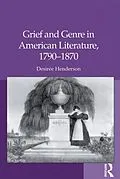Focusing on the role of genre in the formation of dominant conceptions of death and dying, Desirée Henderson examines literary texts and social spaces in eighteenth- and nineteenth-century America. Henderson's study shows that an author's use or rejection of the conventions of memorial literature speaks to their positions within debates about gender, national identity and citizenship, the consequences of slavery, the nature of democratic representation, and structures of authorship and literary authority.
Autorentext
Desirée Henderson is Associate Professor of English and Interim Director of Women's Studies at University of Texas Arlington, where she specializes in early American and women's literature.
Inhalt
Contents: Introduction: grief and genre; The imperfect dead: funeral sermons, fallen women, and the early American novel; American eulogy: William Apess and national mourning; Geographies of loss: Frederick Douglass and the slave cemetery; Lincoln's unrest: Walt Whitman and the Civil War cemetery; Mourning books: the conduct literature of Elizabeth Stuart Phelps and Emily Dickinson; Afterword; the modern genres of grief; Bibliography; Index.
